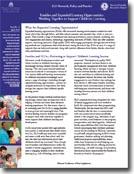The Harvard Family Research Project separated from the Harvard Graduate School of Education to become the Global Family Research Project as of January 1, 2017. It is no longer affiliated with Harvard University.

|
Number 2, April 2012 Families and Expanded Learning Opportunities: Working Together to Support Children’s LearningErin Harris, Heidi Rosenberg, & Ashley Wallace Download a PDF of this publication (131 kb) | View all publications in this series |
Article Information
- Full Text (HTML)
- Full Text (PDF: 131 kb)
Related Resources
- Q&A with the authors of Families and Expanded Learning Opportunities
- New Learning Opportunities Mean New Opportunities for Engagement
- Year-Round Learning: Linking School, Afterschool, and Summer Learning to Support Student Success
- Partnerships for Learning: Promising Practices in Integrating School and Out-of-School Time Program Supports
- The Federal Role in Out-of-School Learning: After-School, Summer Learning, and Family Involvement as Critical Learning Supports
Families play an important role as the primary bridge between the multiple learning settings where their children learn and grow. For this reason, there is an increasing need for expanded learning opportunities (ELOs), including afterschool and other out-of-school time programs, to engage families in more meaningful ways to better support children's learning and development.
In Families and Expanded Learning Opportunities: Working Together to Support Children’s Learning, the second brief in our series with the National Conference of State Legislatures, we explore the ways that families and ELOs must work as equal partners in order to ensure ELOs are contributing to children's learning in meaningful ways. These include:
- Understanding children's learning needs
- Ensuring that program goals and activities align with children's larger learning goals
- Facilitating communication with other settings where children learn to better coordinate learning supports (e.g., tutors, books, and other learning materials)
- Sharing key data and results regarding children's learning progress
This brief discusses these elements in more detail, supported by evidence from recent research.
What are expanded learning opportunities?
Expanded learning opportunities offer structured learning environments outside the traditional school day: before and after school; in summer; and through extended-day, -week, or -year programs. ELOs provide a range of enrichment and learning activities in various subjects including arts; civic engagement; and science, technology, engineering, and math (STEM). ELOs are part of a range of supports that can help youth succeed, along with positive influences from family, friends, school, and other enrichment activities.
ABOUT THIS SERIES
This series by Harvard Family Research Project and the National Conference of State Legislatures (NCSL)—a bipartisan organization that serves the legislators and staffs of the nation's 50 states, its commonwealths, and territories—addresses topics in expanded learning opportunities (ELOs). This series aims to highlight research evidence on ELO best practices and effects on youth and to discuss the policy implications related to this research.

